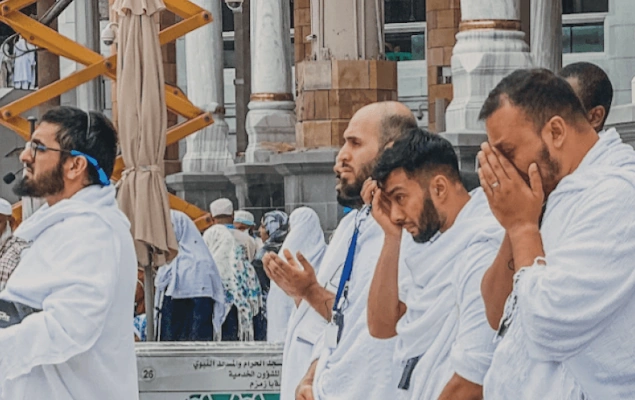In Islam, every act of worship starts with a clear intention. This is called Niyyah. It is a simple but powerful part of your worship.
Niyyah means deciding in your heart to do something for the sake of Allah. Without Niyyah, acts of worship like prayer, fasting, Hajj, or Umrah are not valid.
For Hajj and Umrah, Niyyah plays a big role. It marks the beginning of your journey to the House of Allah. This intention turns a trip into an act of worship.
The Prophet Muhammad (peace be upon him) said:
إِنَّمَا الأَعْمَالُ بِالنِّيَّاتِ
Translation: “Actions are judged by intentions.”
(Sahih al-Bukhari, Hadith 1)
This shows that every step of Hajj and Umrah should begin with a sincere Niyyah.
What is Niyyah?
Niyyah means intention. It is what you decide in your heart before doing something. You don’t have to say it out loud. It is not a chant or a formal phrase. It’s a silent thought or decision you make for Allah. Many pilgrims say the Niyyah out loud. This is a common practice, but not required.
The heart is the place of Niyyah. It’s where the real intention lies. As long as you know what you are doing and why you are doing it, your Niyyah is complete.
وَمَا أُمِرُوا إِلَّا لِيَعْبُدُوا اللَّهَ مُخْلِصِينَ لَهُ الدِّينَ
And they were not commanded except to worship Allah, [being] sincere to Him in religion. (Surah Al-Bayyinah, 98:5)
Is Verbal Niyyah Required?
No, it is not required to say your Niyyah out loud. It is okay to speak it if it helps you focus. But the real Niyyah is in your heart.
Some people confuse Niyyah with Talbiyah. But they are not the same.
- Niyyah is your intention.
- Talbiyah is a prayer you say after making Niyyah.
Saying the words “Labbayk Allahumma Umrah” or “Labbayk Allahumma Hajjan” is not the Niyyah itself. It follows your intention.
قُلْ إِنَّ صَلَاتِي وَنُسُكِي وَمَحْيَايَ وَمَمَاتِي لِلَّهِ رَبِّ الْعَالَمِينَ
Say, ‘Indeed, my prayer, my rites of sacrifice, my living and my dying are for Allah, Lord of the worlds. (Surah Al-An’am, 6:162)
Niyyah for Umrah
You make Niyyah for Umrah at the Miqat. Miqat is a set place that marks the start of your Ihram.
Put on your Ihram clothes before reaching Miqat. When you cross it, you must be in a state of Ihram with your Niyyah made.
The common phrase for intention:
لَبَّيْكَ اللَّهُمَّ عُمْرَةً
Labbayk Allahumma Umrah
O Allah, I am here to perform Umrah.
You say this after making the intention in your heart.
Niyyah for Hajj
There are three types of Hajj:
- Hajj al-Tamattu’: Umrah first, then Hajj.
- Hajj al-Ifrad: Hajj only.
- Hajj al-Qiran: Hajj and Umrah together.
Each type has a different time for Niyyah.
For Tamattu’:
- Do Umrah first.
- Remove Ihram.
- Make a new Niyyah for Hajj on 8th Dhul-Hijjah.
For Ifrad and Qiran:
Make Niyyah at Miqat when you wear Ihram.
Common phrases for Hajj Niyyah:
- Labbayk Allahumma Hajjan (O Allah, I am here to perform Hajj)
- Labbayk Allahumma Hajjan wa Umrah (O Allah, I am here to perform Hajj and Umrah)
These phrases help remind you of your purpose, but the real Niyyah is in the heart.
وَلِلَّهِ عَلَى النَّاسِ حِجُّ الْبَيْتِ مَنِ اسْتَطَاعَ إِلَيْهِ سَبِيلًا
And Hajj to the House is a duty that mankind owes to Allah (Surah Aal-Imran, 3:97)
Common mistakes to avoid
- Verbal Niyyah is not required because intention in the heart is enough.
- Niyyah and Talbiyah are different since Niyyah is your intention, and Talbiyah is what you say after.
- Make Niyyah at the correct place, which is the Miqat or just before starting the Hajj rituals.

